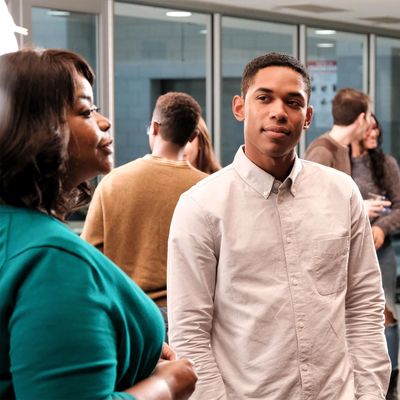
The title of Luce stands for “light”: It’s what upper-middle-class white American parents Amy and Peter Edgar (Naomi Watts and Tim Roth) named the 7-year-old black child they adopted from Eritrea in the middle of a grisly war. The movie opens with the high-school-aged Luce (Kelvin Harrison Jr.) addressing parents, teachers, and students at a northern Virginia assembly, where he calls for his peers to stand and honor the elders who have made their kids better people. Afterward, a grown-up says that Luce should be cloned, and everyone agrees with a laugh. He’s a credit to their school, Luce is. Someone invokes Obama in passing, and Luce is certainly in that studious, peace-making mode. As Amy and Peter beam and accept congratulations, only one person is frowning: a black teacher, Harriet Wilson (Octavia Spencer), who has seen the less luce side of Luce. She’s worried about a paper he wrote about black militancy and the morality of extreme violence. She senses his inner tensions.
Directed by Julius Onah from a script by J.C. Lee (based on his play), Luce is often stilted (Would those high-school students really smile and cheer in unison for their parents and teachers without a hint of irony?), but is it cunningly stilted? Are we being set up by Luce’s impeccable manners and by the mostly white, mostly squeaky-clean school (it’s like ’60s TV’s Room 222) for something more disturbing? Yes, in fact, we are being set up, but it’s still a stiff, overly careful piece of filmmaking. Onah and Lee never fully disguise the film’s stage origins and its hokey “buried secret” construction. Most of the big stuff happens “offstage.”
In some ways, though, the existence of an offstage helps gives Luce an eeriness that stays with you after it ends — not because of anything that happens onscreen but because of what might have happened before the story begins and might well happen after the fade-out. Central to its power is Harrison’s performance. When Luce lies, there are no tells, no signals to the audience that his stiltedness is cunning. It’s even possible that the things he might have done — theft, vandalism, sexual assault — he actually didn’t. Maybe we’re just inferring his guilt. Maybe we’re (and this is worse) projecting on him. We know that Luce is sensitive to tokenism, that he’s uneasy with being a “poster boy.” What we can’t always see is how that uneasiness translates into action — and whether his rage is so carefully channeled that he’ll never have to take responsibility for it. That’s the brilliant aspect of Luce’s stiltedness. By keeping certain parts of Luce’s character subtextual or out of sight, the actor and filmmakers undercut their problem-play structure. They make you doubt everything and everyone. I’m still unsure of some things.
Lee’s most original creation is Spencer’s Harriet Wilson, who’s over-vigilant with black students. She gives herself permission to search their lockers, in which she often finds items that shouldn’t be there, and she reports them, privacy (such as it exists for students inside school) be damned. She fears what will happen to her black students if they don’t watch their backs, if they don’t understand that the civil-rights issues debated in her history class are academic for white students but “life and death” for black students. Harriet has her own problems: Her mentally ill sister (Marsha Stephanie Blake) shakes Harriet’s equilibrium, throws her sense of order out of whack. Having accomplished more than she dreamed possible, Harriet is reminded of how sibling-close close she is to chaos and dysfunction. Luce has more power in this society than she does.
Oddly, Lee has chosen to make his protagonist not Luce or Harriet but the white mother, Amy. It puts the film in the category of The Omen: Amy (a pediatrician) has to grapple with the idea that her model child — a credit to her and her husband’s liberalism — might have a demon inside of him. No, Luce isn’t remotely that crude, but, like it or not, the film embraces demon-child movies as its antecedent, and the threat of violence hangs over every interaction, no matter how casual or mundane. Watts is — as always — peerless at conveying a mother’s panic, the horror of seeing her carefully constructed and seemingly unshakable foundation crumbling before her eyes; and Roth nails the nuances of a man who’s troubled but also aware that (in common with most dads) the buck doesn’t stop with him — that it’s ultimately mom’s problem. Fathers recede in this sort of drama because, honestly, they do.
In the end, you’re left with a movie that doesn’t quite jell but expands in the mind. It’s an excellent Book Club movie — it demands to be discussed, debated, embraced, or (perhaps) rejected. Luce spells out to some white liberals that they have no fucking clue what’s really going on in the heads of their black children (or the black people they paternalistically/maternalistically patronize and regard on some level as their children), and to black audiences that a bifurcated, oppositional identity is a given, not an exception.


